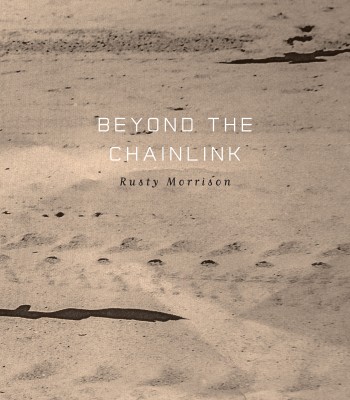Book Review
Rusty Morrison’s beautifully written book, Beyond the Chainlink, reveals the beauty inherent in fragmentation. Presented as an interconnected series of spare, image-driven lyrics, the poems in this carefully crafted collection invite a more active role on the part of the reader, prompting him or her to forge connections between images, sounds, and types of language. Morrison redefines the relationship between the artist and her audience, using form and technique to foster a dynamic relationship between the text and its reader, which makes the text a collaboration in which the reader actualizes the poem through his or her imaginative work.
With that in mind, Morrison’s juxtaposition of different types of poetic imagery proves especially thought provoking as the book unfolds. Frequently offering concrete, tangible images pared of any rhetorical explanation, these evocative poems treat language as generative, giving rise to numerous possibilities for interpretation. Indeed, the carefully chosen images in Beyond the Chainlink evoke myriad associations on the part of the reader, which ultimately multiply with each line, and every stunning turn of phrase. It is the reader’s task to negotiate these possibilities, to find his or her way back from the place of pure possibility where the poet has led them. This level of trust that Morrison places in her reader is both exciting and refreshing. For example, Morrison writes in “Sensework”:
Not the lilting, crane-fly silence of memory
but silence compressed into the finality
of iron—
element left when a dying star has consumed its fuel.
Here Morrison pairs imagery of the natural world with that of industry, which she evokes through word choices like “fuel” and “compressed.” What’s interesting about this passage is the spark that this juxtaposition creates in the mind of the reader. These spare, evocative lines invite us to consider the stars, astronomy, and the universe more generally as mechanical, but also very much alive at the same time. With only a few carefully chosen words, Morrison asks many compelling questions: Why does culture often reduce living, breathing organisms to mere cogs in a machine? How does this emphasis on utility reduce what is possible within culture, and within the individual consciousness? As Morrison sparks the reader’s imagination through unexpected pairings of images and concepts, her book raises ambitious philosophical questions with subtlety and grace. Beyond the Chainlink is filled with thought-provoking poems like this one, which invite the reader to participate alongside the poet in the process of addressing these compelling metaphysical concerns.
Along these lines, Morrison is skilled at balancing image and abstraction, offering poems that keep abstract philosophical discussions grounded in the everyday. As the book unfolds, the particular almost always serves as a point of entry to the universal. I’m intrigued by this use of specific, and often domestic, imagery as a doorway to philosophical musings. Indeed, Morrision’s work is noteworthy in that she elevates what most would consider a feminine domain, revealing its implications for metaphysical conversations that concern men and women alike. Consider this passage:
Because dusk begins
as dirt under my fingernails,
I court the dirt. A body.
I learn it
by watching earth court sky.
Here Morrison uses the imagery of dirt under a woman’s fingernails, perhaps from gardening or some other type of domestic labor, as a point of entry to a discussion of astronomy. In doing so, Morrison’s speaker sees the orbits of celestial bodies reflected in her own being. In this sense, individual consciousness, and the body itself, afford insight about much more than that one person: the “sky,” “earth,” and their movements are embodied, internalized, and visible even in the very specific. Morrison’s treatment of self as world, and the individual as a universe unto herself, is carefully grounded in tangible, concrete imagery all the while. Like much of the work in Beyond the Chainlink, this poem speaks to the significance of even the most commonplace experiences, as they afford insight into much larger questions about the self and one’s relationship to the world at large.
In short, Morrison’s Beyond the Chainlink is a beautifully written collection, as philosophical as it is concrete and carefully grounded. A lovely addition to this writer’s already accomplished body of work.
About the Reviewer
Kristina Marie Darling is the author of eighteen books, which include Melancholia (An Essay) (Ravenna Press, 2012), Petrarchan (BlazeVOX Books, 2013), and Scorched Altar: Selected Poems and Stories 2007-2014 (BlazeVOX Books, forthcoming). Her awards include fellowships from Yaddo, the Ucross Foundation, the Helene Wurlitzer Foundation, and the Hawthornden Castle International Retreat for Writers, as well as grants from the Kittredge Fund and the Elizabeth George Foundation. She is currently working toward a Ph.D. in Poetics at S.U.N.Y.-Buffalo.
